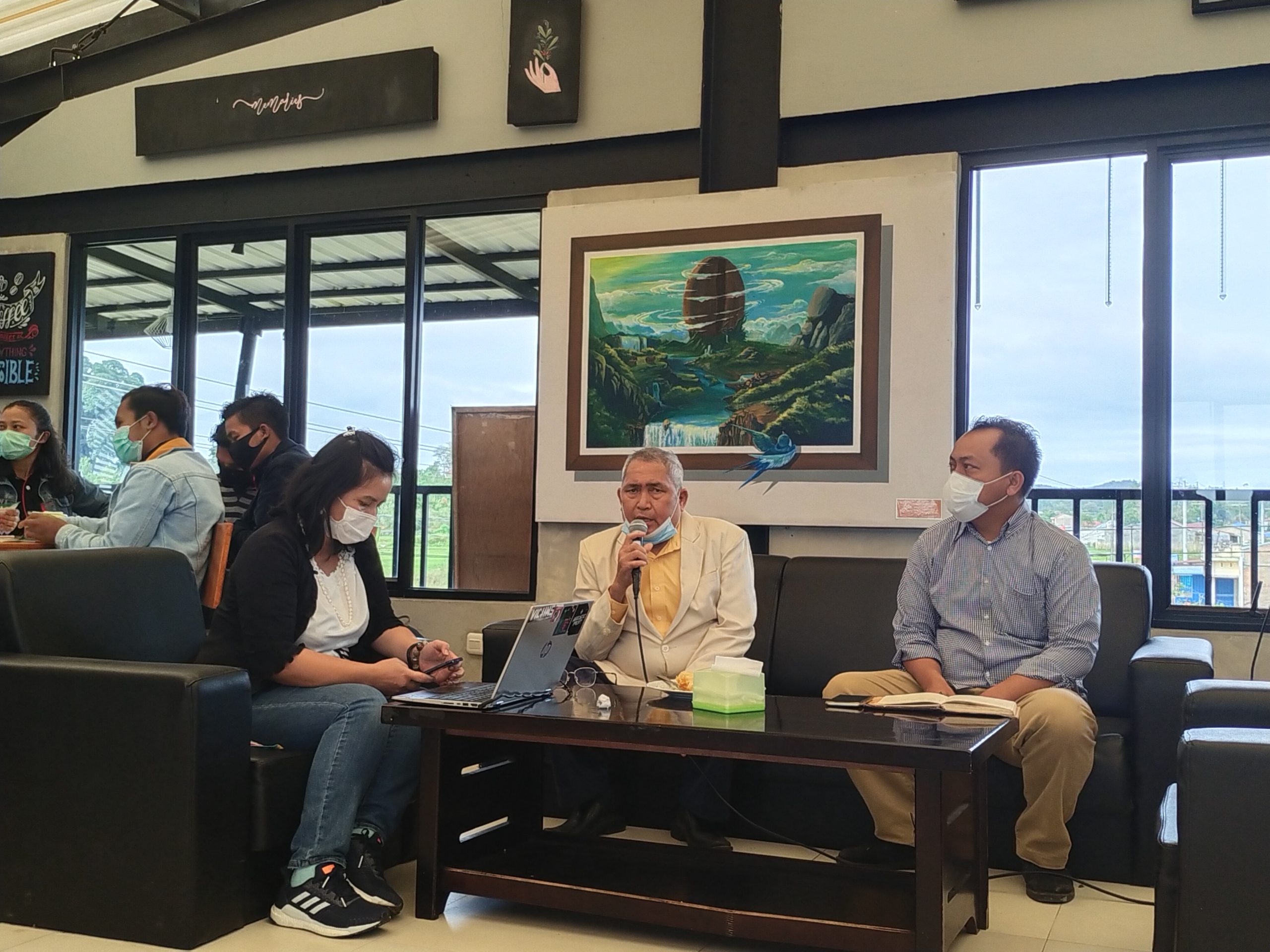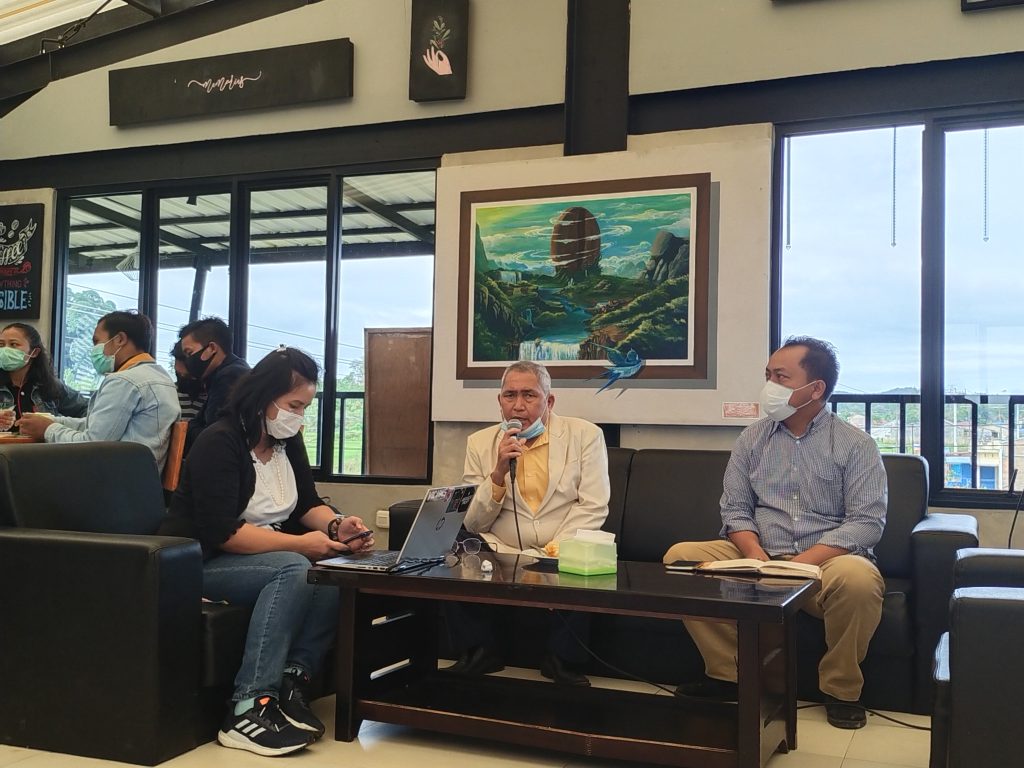Dolok Sanggul (27/01/2021), the Covid 19 Pandemic Period which has been going on for almost a year, is a very important event for all parties to ponder and reflect together. All nations are not only struggling with the aspect of health, but also the impacts caused. Almost all experienced economic recession and reconstructed development strategies to survive and improve their economic conditions. The food sector, which has been neglected so far, is a common concern. There are not many policies that support food security so far. Farmers and indigenous peoples who have consistently produced food have often been neglected. Land which supports food is also exploited for development purposes that have nothing to do with food availability.
Land or agrarian conflicts continue to increase in Indonesia, even during the Covid-19 pandemic and this has become a concern for many parties, especially civil society organizations. In fact, if you look carefully, during this pandemic, farmers and indigenous people can be said to be the groups that still have access to food, when other sectors must be supported and subsidized.
Unfortunately, until now, the awareness of policy makers is still focused on large-scale agricultural infrastructure developments, tourism, industry, etc. Not on how to strengthen national food by empowering farmers and indigenous peoples. In fact, these large-scale developments have actually triggered the height of agrarian conflicts in Indonesia, including in the Lake Toba area. Meanwhile, resolution of old conflicts has been slow.
Since 2015, KSPPM, AMAN Tano Batak, HARI, Bakumsu and several NGOs in North Sumatra have submitted complaints about resolving 16 agrarian conflicts in the Lake Toba area to the Indonesian government. However, unfortunately only one case is currently being handled seriously. The issuance of SK.8172 / MENLHK-PSKL / PKTHA / PSL.1 / 12/2020 concerning the establishment of MHA Pandumaan Sipituhuta Customary Forestry is the only case that has been seriously followed up by the government in the last five years. The issuance of this decree deserves to be grateful for the hope that the progress of resolving other cases can continue. Unfortunately, the issuance of this decree was also not without problems, because it was not in accordance with what was expected by the Pandumaan-Sipituhuta indigenous people. Not all of their menenyan forests are designated as customary forests. Some of them have even been allocated as areas for food security.
This policy makes the lives of farmers and indigenous people even more difficult, which until now are still struggling to defend their land rights. In fact, the struggle for land rights is a human right that must be fulfilled by the state.
In response to the issuance of the decree, KSPPM, AMAN Tano Batak and Raoul Walleburg Institute (RWI) held a seminar on “The Future of the Pandumaan-Sipituhuta Indigenous Peoples after the issuance of the Pandumaan-Sipituhuta Customary Forest Decree No.8172 / 2020 on December 30, 2020”.
Pdt. Haposan Sinambela, representative of MA Pandumaan-Sipituhuta, who was one of the speakers at the event, hopes that all of their incense forests will be returned to the indigenous people as their initial demands since fighting. “We clearly do not accept the decision (SK No.8172/2020), whether it is Food Estate or something, we only want that the forest does not decrease and does not increase for us,” said Pdt. Haposan Sinambela.
After the description from pdt. Haposan Sinambela, Director of Conflict Management for Tenure and Customary Forests (PKTHA), M. Said explained the process of issuing the decree. According to him, the Customary Forest Reserve Decree submitted by President Joko Widodo in 2016 covering an area of 5172 ha is different from the customary area that was issued by Regent Humbang Hasundutan in 2019. The determination of the Pandumaan-Sipituhuta customary forest departs from the Regent’s Decree and determines which forest stands still, while villages, farms, and forests that are considered thickets are not included in the Pandumaan-Sipituhuta customary forest.
Sandra Moniaga, Commissioner of Komnas HAM RI, explained the Long Journey to Restore Rights to Customary Property in Pandumaan-Sipituhuta, practices of expropriation of community land by the state and aspects related to human rights due to land grabbing. “In fact, the existing constitutional law in Indonesia is much more progressive than in other countries because our constitution has recognized the rights of indigenous peoples,” said Sandra. Responding to the newly enacted Pandumaan-Sipituhuta Customary Forest Decree, Sandra Moniaga questioned the reduction in the area of customary forest that had been determined from those proposed by the customary community and the Regent’s Decree in 2019. This Customary Forest Decree is also not in accordance with the minutes of the verification team formed by the Ministry of Environment and Forestry. alone. “What is the government’s plan to restore customary forest rights as a whole?” asked Sandra to the Ministry of Environment and Forestry and the Humbang Hasundutan Regency Government.
Furthermore, Delima Silalahi from KSPPM explained the chronology of MA Pandumaan-Sipituhuta’s struggle, from the beginning to getting SK. 8172 / MENLHK-PSKL / PKTHA / PSL.1 / 12/2020. Unfortunately, the designation of Customary Forest is not in accordance with the demands of the community. Because there are 2051 Ha of customary territory allocated into the Food Security area without prior consultation with the Indigenous Peoples as the owner of the customary territory. This decision gave birth to confusion in the midst of society. “KSPPM as a companion asks the government or KLHK to return the entire customary area to the customary community. Any development planning should be in accordance with the plan for the area of life of indigenous peoples,” said Delima.
The last resource person, Abdon Nababan, AMAN National Council, emphasized that the issuance of this decree made MA Pandumaan-Sipituhuta a legal subject recognized by the state. “By acknowledging them as legal subjects, the state will see this community exist and have constitutional rights,” he said. Abdon Nababan offers two ways to respond to this decree, namely by submitting or writing his objection to the Ministry of Environment and Forestry and / or testing the legitimacy of the Minister of LHK’s authority which reduces constitutional rights which could be a violation of the Human Rights of MA Pandumaan-Sipituhuta.
Participants were very enthusiastic in responding to the speakers’ exposure. Some responders even emphatically expressed their disappointment with the KLHK policy which only designated 2393.83 ha of the Pandumaan-Sipituhuta customary area as Customary Forest and the government’s unilateral action allocated 2051 ha of its customary territory for Food Security. At least that was conveyed by Edu Pandiangan, Kersi Sihite, Op. Febri Lumbangaol, Prof. Lijan Sinambela, Zeki Munte, Darsen Lumbangaol, etc.
Responding to questions from the participants, M. Said reiterated the process of determining their customary forest. “Your customary territory is not going anywhere, what we have SK is only areas with forest stands. Your customary territory remains your property in accordance with the Customary Territory Decree stipulated by the Regent Humbang Hasundutan, ”said M. Said.
This seminar was closed by Roganda Simanjuntak AMAN Tano Batak as moderator.
The seminar which was attended by around 80 participants and followed by 65 online participants was also accompanied by various arts and cultural activities that presented the Medan O-USU Theater group, Martahan Sihotang flute player, environmental-themed songwriter, Arif Girsang, USU’s 16 Gang Band and several youth band groups in Humbang Hasundutan Regency. ***
by: Kalang Zakaria










